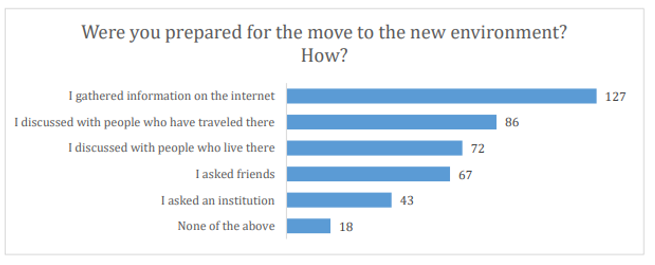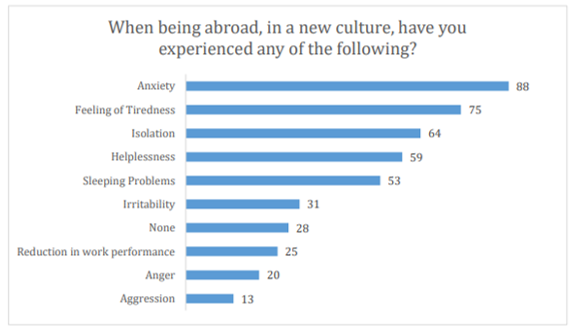Studying intercultural communication (or communication between people with differing cultural identities) can help us gain more self-awareness and better communicate in a world with changing demographics and technologies. But before going deeper into the topic, let us build a proper ground for the information that is going to be presented in this guide and define the main terms we are going to use further.
For the purpose of this guide, we are going to explore the meaning of the word in its psychosocial aspect. One of the pioneers in the study of culture and institutions, Professor Geert Hofstede, defines culture as “the collective programming of the mind distinguishing the members of one group or category of people from others”. A quick check in the Cambridge Dictionary shows us that culture can be simply defined as “the way of life, especially the general customs and beliefs, of a particular group of people at a particular time (e.g. modern Japanese language and culture, youth/working class culture)”.
a great definition of the term can be found in Merriam-Webster online dictionary: communication is “the act or process of using words, sounds, signs, or behaviours to express or exchange information or to express your ideas, thoughts, feelings, etc., to someone else”
Many people use both terms as synonyms, however, there are nuances in the meanings behind each of them. There is a very interesting article, published Spring Institute entitled “What’s the difference between multicultural, intercultural, and cross-cultural communication?” The author (Paula Schriefer) explains that “multicultural” describes a society that consists of several cultural or ethnic groups, without necessarily always interacting with each other. “Intercultural”, on the other hand, describes communities in which there is a deep understanding and respect for all cultures. So, the term intercultural communication focuses on the mutual exchange of ideas and cultural norms and the development of deep relationships.
Eager to learn more? Check this collection of flashcards with terms in the field of Intercultural Communication https://quizlet.com/153493246/flashcards
Once we have settled the terms, we are going to use, let us dive deeper into the topic.
When talking about Intercultural communication one shall always mention the so-called the cultural iceberg. The model was developed by the anthropologist Edward Hall and represents the “visible” and “invisible” elements of the culture. In the picture below, you can see some examples of those elements.
Have a look at the picture and reflect on how would you describe your iceberg and what would be your attitude to someone having a different iceberg, especially when it comes to things from the very bottom of the picture.

Actually, in the intercultural communication, usually the conflicts occur, when the bottoms of two icebergs crash in each other. However, having a positive attitude, you can avoid the crash of your iceberg with the others. So, do not forget – be open, smiling and kind to the person you communicate with, and they are very likely to do the same in return.
“It all sounds cool but how to connect this with the real life?” you might ask. Well the partners organisations involved in the project defined the best tips they would give to the young people they work with. Check them out and find the one you like the most:
- Never underestimate the opportunities for “Internationalisation at home” – Before leaving to your dream destination, you might have plenty of opportunities to meet this culture at your home. For instance, the local university that hosts foreign students might look for volunteers to assist them in their first days upon arrival. Or a local NGO that welcomes volunteers from abroad might look for buddies/mentors, who can help them during their stay. By joining such initiatives, you would definitely have the chance to gain rich intercultural experience and make friends from all over the world. And of course, they would be very eager to return you the favour, once you become a new-comer in their own country.
- Before leaving abroad, it is useful to prepare for this experience through films, books, documentaries and research, possibly in the language spoken in the country you plan to move to.
- Join student/expert worker/migrant Facebook groups and get to know and interact with some of them before you move so that by the time you arrive you would have made connections that you can rely on for information, interactions and advice.
- Attend to language courses – it is not only a nice way to meet other foreigners, but it is also a good way to get to know something about the local culture and language. And who knows where that might take you, in the long run, it can be another way to meet more local people. Being able to say a couple of phrases or sentences is always far better than not being able to say anything at all. There is no better time to learn a language than when you have a chance to use it in your daily life.
- Do not be afraid to ask – Ask people questions about their cultures, customs, and views. People, for the most part, do not mind being asked questions and are usually pleasantly surprised when others show interest in their cultures. Many of us might be shy to ask questions, or are taught that it might look impolite, but if you are thoughtful, asking questions can help you learn about people of different cultures and help build relationships.
- Connect more with the locals – A tourist trip gives you the opportunity to get in touch with new worlds but if you really want to know a culture, better find ways to work, study or volunteer abroad and do a full immersion into the local culture.
- Prepare not only language wise, but mentally, too: try to understand how your beliefs and values might mediate your approach and understanding of cultural differences. Try to identify the judgement and stereotypes you live with and keep them in mind every time you shall handle unusual situations.
- At the beginning of your experience abroad, try making a mind map depicting your aims and objectives, desires, needs, expectations, and fears. In the middle of a sheet of paper try to illustrate an image of what is on your mind (self), what things are to your mind (perspective and opinion), what you should be mindful about (aims and objectives), what you mind (needs and fears), and what you don’t (strengths and ability to contribute). This exercise can assist you to explore, define, navigate, and evaluate you journey in their new cultural surroundings.
- Record your experience (and make sure you have something to record during your experience) – you might choose to keep a diary, which only you will ever read, start a blog or create a special album on your profile of the social media, where you share photos of your your new home, the new food you try, events, different new activities you try, the new places you visit (everything that happen during your experience), make a 1-year-in-1-minute video. You might make a combination of all mentioned above or come up with another idea. The format does not really matter, but the important thing is to collect all those little memories. Having all this material for reflection, in the end you will literally see how much you have learned and changed yourself and your perception of the world.
- Look for local events and participate – A look in the local press, social media groups, and community centers is a sure way to find local events. Participating in such occasions is an opportunity to get to know your new surroundings and meet local people. In this way, you may end up in intriguing parts of your area where you wouldn’t go otherwise. Also, this can be an informal way to network and learn about local customs and social norms in practice
- Do not be afraid to be proactive – besides joining the local activities and celebrations in the new country, you might want to organize your own ones. You have a special day (your birthday or your national holiday)? Cook your favourite meal from your home and share it with your new friends. They would really appreciate it and will eagerly share their traditions with you, too.
So, which tip did you like the most and will try during your next experience abroad? Think about it, make sure you save this idea somewhere and do not forget using it 😉
Preparing yourself before your experience abroad can be great and knowing the local culture always helps. In this section, we are sharing with you some brief introduction to the customs, norms of behaviour and interesting facts about the partner countries of this project: Bulgaria, Greece, North Macedonia, Italy and Malta!
The Italians, by culture and tradition, are an open and welcoming people.
A demonstration of these characteristics is proxemics: in Italy (and this also applies to other Mediterranean countries) interpersonal distances are shortened, to greet a friend you hug and stay very close during a conversation.
This does not mean that we are rude, even if this behavior may appear exaggerated and disrespectful to those from a different culture.
In Italy, emotions are expressed without shame and we speak freely even with people we do not know. In Italy, you can get angry on the phone on a crowded bus without anyone around us considering this embarrassing behavior.
When an Italian asks “How are you”, he expects a real answer from the interlocutor. How are you is not a courtesy interlayer, but a concrete question.
Despite the openness and the ability to be welcoming to other cultures, one of the most important characteristics of the Italian people are family ties and customs handed down from generation to generation.
In Italy, everything revolves around the family. The numerous family businesses inherited from generation to generation demonstrate this. We all love to come home after being away for a long time. But people of Italian origin often feel the need to recover a closer relationship with their families. And this is demonstrated by the different customs typical of Italian culture. Sunday lunch, for example, is much more than a simple lunch. It is a moment of gathering in which to come together as a family after the daily grind to relax and spend the day with friends. Sunday lunch can last a whole day!
Even those who emigrate abroad for work try to keep Italian culture alive: Italian immigrants usually form colonies and interact mainly with their compatriots within the new community, keeping alive the most important traditions of their countries of origin. First of all the culinary ones: pizza and spaghetti cannot be missing!
Food Customs at Ceremonial Occasions. Rabbit stewed in wine is a specialty, often with some of its sauce served over pasta as a first course. Tender lamb is eaten at Easter.
Religious Beliefs. Over 98 percent of the population are Roman Catholics, who tend to be highly observant. The year is filled with important religious events, and all localities are identified with patron saints who are celebrated, somewhat competitively, with fireworks and festa pageantry, including processions.
Formal greetings begin and end with a handshake.
A person’s title followed by their surname is common among new acquaintances. Only address a person by their first name when invited to do so.
Among close family and friends, people tend to pat one another on the back, shoulder or arm.
Older people may greet others with a nickname or a diminutive. For example, Guzeppi may be greeted as Guz.
Non-Verbal Communication
Personal Space: The Maltese tend to keep less personal space, often sitting or standing quite close to one another,
Physical Contact: The Maltese tend to be quite tactile and affectionate people. Hugging, kissing and back-slapping in public are common.
Eye Contact: Maltese usually hold direct eye contact during conversation.
Greetings
In Greece, a handshake is the most common greeting, regardless of age, gender, and social status. Close friends may greet each other with a warm embrace or a kiss on one or each cheek. Others might slap or pat one another’s arm or back a few times. Maintain direct eye contact when introduced to someone for the first time. If the person is older than you, address them by their title and last name unless invited to move to a first-name basis. This formality is less necessary between youths or friends. The common verbal greeting in Greece is “Yassas” (Hello) or the more informal “Yiasoo”. Address people by their appropriate title, e.g. ‘Keerios’ (Mr) for men and ‘Keeria’ (Mrs) for women.
Etiquette
There is a cultural expectation in Greece that one accepts the generous offers of others. If you refuse something legitimately, it may be seen as a token protest made out of politeness. Therefore, instead of accepting your refusal, a Greek may insist that you receive what is given. Refusing something offered can be interpreted as an insult. For example, refusing food implies you do not trust the person’s cooking skills. It is best to accept everything offered. Be careful when commenting on a Greek’s possessions. If you show a lot of admiration, they may feel a compulsion to be generous and give it to you. In Greek culture, “on time” can mean 20 or 30 minutes late. Nevertheless, tardiness is usually accompanied by a heartfelt apology and a legitimate excuse.
Communication
Indirect Communication: Greeks can be quite indirect communicators. To avoid conflict or confrontation, they often take a long-winded, roundabout approach to conveying their messages sensitively and tactfully.
Communication Style: Greeks tend to use quite verbose, theatrical, and intense language. This communication style can seem exaggerated as they commonly show their emotion in their speech. While interruption is not best practice or advised, it is common.
Raised Voices: Greeks may speak with impassioned, loud voices when talking to each other. This can be an expression of excitement or conviction. Alternatively, a Greek becoming more nonverbal and reclusive would be a stronger indication that they are seriously upset.
Non-Verbal
Personal Space: Greeks do not require a lot of personal space between one another. Therefore, they may sit or stand at slightly closer proximities than what you are used to. It is not unusual to have one’s belongings or body touching the stranger next to them when queuing, sitting/standing on public transport, or in a crowd.
Physical Contact: Greeks are generally very tactile people, comfortable with open affection. Hugging and kissing are common in public spaces. People often touch one another on the back, arm, or leg to emphasise their point as they talk.
Body Language: Expect many hand gestures to be used during communication. Greeks tend to be very expressive in their body language.
Expression: Despite being animated communicators, Greeks can have a more serious exterior when first meeting. They may not smile frequently or exchange much humour or pleasantries during their first interaction with strangers (e.g. shopkeepers). People tend to be more warm and unreserved around their friends.
The Bulgarian Alphabet – when you come to a new country, you do not necessarily need to learn the language or the entire alphabet, especially if you plan to stay for a shorter period of time. But realizing that ВАРНА is actually VARNA might save some funny situations along the way.
“Yes” or “No” – a lot of people have heard that Bulgarians express agreement and disagreement differently – by shaking heads for “yes” and nodding for “no”. In general this is true, however many young people, who have been abroad or have rich experience in communicating with different cultures do not longer follow this rule (especially when they communicate with foreigners). So the best way to understand what your Bulgarian friend actually means is by asking them to say yes or no.
Guests Bulgarian people are quite hospitable in general and they do like welcoming guests. However, there are two very important things to keep in mind when you come over the place of your Bulgarian friend
- Bring a small present – like a box of juice, bottle of wine or some sweets. (Bulgarians usually do not like guests to come “empty-handed” in to their homes)
- Take off your shoes, when you enter the house. You will be offered to have a pair of slippers, or you can walk barefoot in the house, if you like
Greetings
The common greeting between strangers is a firm handshake and eye contact.
A light hug may occur between two friends. Close friends and family may greet by giving two or more kisses on alternating cheeks. The common verbal greeting is “Dobro utro” (Good morning), “Dobar den” (Good day) or “Dobro vecher” (Good evening).
Communication style
People are very kind and also very curious of other cultures. Do not be surprised if they ask you questions that seem inappropriate, such as how much money you make, what your house is like, etc. They are honestly just curious about how other people live.
The communication style of most Macedonians is defined by the background of the person (religious, ethnic, social, educational, etc). In general, most people are polite but direct; if they consider something very important they won’t hesitate to speak up and argue about it and vice-versa. Even though they are good listeners they tend to speak more. Most of the time they speak fast and loud, using gestures and nonverbal communication.
Basic Etiquette
Do not leave two windows open in a room. There is a cultural belief that when wind passes through a room, it will cause people to get sick. This belief is called ‘promaja’. Christian Macedonians generally drink alcohol with their meals and make toasts of friendship and agreements. ‘Rakija’ (a fruity brandy) is a popular drink. The common toast is “Nazdravje” meaning “for your health”. Macedonians have quite a relaxed view of time. It is common to be late or for meetings and other events to run over time.
Time is viewed in a loose sense. There are many words for “immediately” and “now”, but even that usually means “within the next 20 minutes”. Buses are rarely on time, and it is important to remember that they will eventually come; they’ll just be late. Macedonians generally stay up quite late and may socialize into the later hours of the night. It is not necessary to tip restaurants or service people in North Macedonia.
Take off your shoes before entering someone’s home. Expect tea or coffee (it is very common to be offered with Turkish coffee) to be offered when at someone’s house. Accept these refreshments even if you do not drink them all. If a Macedonian has invited you to their house for a meal, they rarely expect visitors to contribute to the food. It is expected the invitation involves their offer to provide everything served. Sometimes, Macedonians may serve ‘mezze’ instead of a full meal. This is a selection of small dishes that accompany alcoholic drinks. The dishes will be paired to match the alcohol served. For example, salad is meant to be the accompaniment to hard spirits.
At the initial part of the BIC project, the partners have conducted an interesting survey held from December 2019 – March 2020. The questionnaire included 19 questions divided into two sections: general information and experience abroad and was filled in by 220 young people. We would like to share with you the main findings from this activity
- Besides the pure statistics, we would like to share with you some more detailed inputs, shared by the respondents
- A respondent from Italy who went to Zambia for volunteering shares: ‘Differences in attitude towards work, religion and in sense of humor, which make conversations difficult and embarrassing’.
- Another one from Portugal who spent two months in Egypt says that ‘The country was completely different from what I was used to, religion, culture, heat, I was often misunderstood, or there were things that the culture was different and I had to respect’.
- A respondent from Bulgaria who moved to Greece for studying shares: ‘Well, the new body language was definitely a style and communication code I lacked understanding. When people on the street used to nod their heads to respond to my questions I never felt I was getting them at all. Then one more thing was the direct personal questions that I used to receive, as a way of socializing… I was definitely not ready to respond to all of these as I felt too much intrusive all the “interview” what are your parents doing, how much is your salary, what do you do for a living, all of the above in the first 5 minutes of meeting somebody’.
- A respondent from Turkey who moved for several months in the US points out that ‘Many different holidays that I’m not used to were celebrated during my stay which was so different to me. Also elderly were not treated like how we do in Turkish culture, parents and kids are more like friends than authority figures at home’.
Each of us can get a different experience abroad. But we shall remember that the attitude to the whole situation makes (or ruins) the magic. For sure, being abroad every person experiences things, which are different than the ones at home, the question is – Is the “different” thing really bad or can be as good as “mine”?
Every single day, whether we like it or not, the world we live in is becoming more globalized and connected. People, especially youth need to leave their usual comfort zone and visit foreign places for studying, working and travelling.
Many companies open offices on new places or welcome international professionals to their teams. Intercultural communication skills can help us to become more demanded professionals and expand our career opportunities on one hand. On the other hand, even if we do not have ambitions to work in large international organisations, they will be helpful in different other life situations, because, the societies we live in get very intercultural, thanks to the active mobility of people.
So, the sooner we realise the importance of the intercultural communication skills and start developing them ourselves, the better it will be for us.
We do hope you liked the information presented in this guide. In case you are “hungry for more”, we recommend you to check out those resources and links, which will help you expand your knowledge in the field of Intercultural communication:
- Moving to Bulgaria: Survival kit by Foreigner.bg https://www.foreigner.bg/wp-content/uploads/2020/02/Moving-to-Bulgaria-Survival-Kit-final.pdf
- Cultural Diversity Resources on SALTO-YOUTH INCLUSION AND DIVERSITY resource centre https://www.salto-youth.net/rc/cultural-diversity/resources/
- ICY Toolkit (Intercultural Competences for Youth Workers) https://issuu.com/acsesogc/docs/icy_toolkit_english__1_
- Grapes of Wrath – Training Module The material presented here is a collection of knowledge and experiences that stem from the challenges related to migration across three African (Ghana, Kenya, and Senegal) and two European countries (Greece and Italy). We have tried to discover, explore and analyse the processes behind each decision in the long and perilous movement called migration. https://drive.google.com/file/d/1mI6oil39PUDUzKLJ-V13Jg7pNJ0eJPuK
- BIC Project Partnership. 2020. Standpoints on Young People Living Abroad. Retrieved May 23, 2021, from https://project-bic.vum.bg/standpoints-of-young-people-on-living-abroad/
- Countries and their cultures: Malta. Retrieved May 17, 2021, from https://www.everyculture.com/Ma-Ni/Malta.html#ixzz6rF05acf8
- Countries and their cultures: Malta. Retrieved May 17, 2021, from https://www.everyculture.com/Ma-Ni/Malta.html#ixzz6rF18cd6N
- Cultural Atlas: Maltese Culture. Retrieved May 17, 2021, from https://culturalatlas.sbs.com.au/maltese-culture/maltese-culture-communication#maltese-culture-communication
- Cultural Atlas: Macedonian Culture. Retrieved May 25, 2021, from https://culturalatlas.sbs.com.au/macedonian-culture/macedonian-culture-do-s-and-don-ts#macedonian-culture-do-s-and-don-ts
- Culture Crossing Guide: Macedonia. Retrieved May 26, 2021, from http://guide.culturecrossing.net/basics_business_student_details.php?Id=14&CID=122
- EF Italia. (2017) 10 suggerimenti per fare amicizia mentre si è in viaggio. Retrieved May 20, 2021, from https://www.ef-italia.it/blog/language/10-suggerimenti-per-fare-amicizia-mentre-si-e-in-viaggio/
- Evason, N. (2019). Greek culture – references. Retrieved May 06, 2021, from https://culturalatlas.sbs.com.au/greek-culture/greek-culture-references
- com. (n.d.). Traditions in Greece & Greek Islands: GREEKA. Retrieved May 06, 2021, from https://www.greeka.com/greece-culture/traditions/
- Green Planner Magazine. (2020). “3 elementi culturali tipici delle persone di origine italiana”. Retrieved May 20, 2021, from https://www.greenplanner.it/2020/11/06/cultura-italiana-elementi-peculiari/ “ https://www.greenplanner.it/2020/11/06/cultura-italiana-elementi-peculiari/
- Hofstede G. et al. “Exploring Culture”. Sofia, “Klasika I stil” Publishing house. (2003)
- Kendrick Hulse. (2019). The Importance of Intercultural Communication and Understanding. Retrieved May 20, 2021, from https://expatinformer.com/importance-of-intercultural-communication/#:~:text=Many%20scholars%20advocate%20for%20the,have%20any%20experience%20with%20themselves
- Minkov, M. “What Makes Us Different and Similar”. Veliko Tarnovo. Abagar AG. (2007)
- SP Formacione. (2017). Intelligenza culturale – Entrare in punta di piedi nella cultura altrui. Retrieved May 20, 2021, from https://spformazione.it/intelligenza-culturale/
- University of people. (n.d.). What Is Intercultural Communication: Learning New Styles. Retrieved May 20, 2021, from https://www.uopeople.edu/blog/what-is-intercultural-communication/
The project “Building Intercultural Competences: Sharing Good Practices (BIC)” aims to raise awareness among young people about the importance of intercultural communication and mutual understanding by exploring and sharing good practices and innovative methods and strategies of dealing with the challenges in multicultural environments for youth organisations and overcoming cultural shock, stereotyping, prejudices, discrimination and stigmatisation through intercultural communication and dialogue among young people.
 |
Varna University of Management (Bulgaria) |
 |
Sfera International (North Macedonia) |
|
Inter Alia (Greece) |
|
 |
Demostene (Italy) |
 |
Check-IN (Portugal) |
 |
Cross Culture International Foundation (CCIF Malta) |
The European Commission support for the production of this publication does not constitute an endorsement of the contents which reflects the views only of the authors, and the Commission cannot be held responsible for any use which may be made of the information contained therein.



